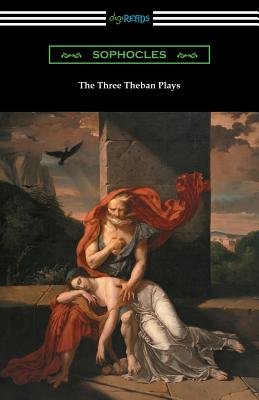







The gods never move faster than when punishing men with the consequences of their own actions.
Desperate to gain control over a city ravaged by civil war, Creon refuses to bury the body of Antigone's rebellious brother. Outraged, she defies his edict. Creon condemns the young woman, his niece, to be buried alive. The people daren't object but the prophet Teiresias warns that this tyranny will anger the gods: the rotting corpse is polluting the city. Creon hesitates and his fate is sealed. Sophocles' great tragic play dramatises the clash between the family and the city and, with high poetry and deep tragedy, presents an irreconcilable but equally balanced conflict. Sophoclean heroine Antigone has become a cultural archetype, the symbol of personal integrity and an icon of political freedom, whilst her coprotagonist Creon can be interpreted as either a civic saviour or a ruthless tyrant. This translation by Don Taylor, accurate yet poetic, was made for a BBC TV production of the Theban Plays in 1986, which he directed.



The most celebrated plays of ancient Athens--Sophocles's seven surviving works--in vivid and dynamic new translations. ANTIGONE, translated by award-winning poet Robert Bagg, is one of seven plays Harper Perennial has published as beautifully designed, stand-alone editions.
Powerfully portraying the clash between civic and familial duty--between morality and obedience--Antigone brings the Oedipus Cycle to a conclusion with the story of the tragic hero's eldest daughter Antigone, who courts her own death by defying the edict of Thebes's new ruler, her uncle Kreon, which forbids giving her dishonored brother a proper burial. This is Sophocles, vibrant and alive, for a new generation.




This Greek tragedy tells the story of Antigone, who sets out to bury her brother against the orders of the king. The play explores themes of duty, family, and the conflict between the laws of mortals and the laws of the gods. Sophocles' writing remains powerful and moving today, making this a must-read for fans of classical literature.
This work has been selected by scholars as being culturally important, and is part of the knowledge base of civilization as we know it.
This work is in the public domain in the United States of America, and possibly other nations. Within the United States, you may freely copy and distribute this work, as no entity (individual or corporate) has a copyright on the body of the work.
Scholars believe, and we concur, that this work is important enough to be preserved, reproduced, and made generally available to the public. We appreciate your support of the preservation process, and thank you for being an important part of keeping this knowledge alive and relevant.


Award-winning poet and playwright Robert Bagg offers a set of exciting and authentic new translations of Oedipus the King, Oedipus at Kolonos, and Antigone--together known as The Oedipus Cycle.
One of the unquestionable acmes of world literature, Sophocles's immortal series of plays centers upon the royal family of Thebes, whose struggles for nobility and greatness lead paradoxically to their own tragic downfalls. Portraying humankind at its worst and most fallible even while exploring the heights of virtue and honor, the plays shine a searing light upon questions of fate and free will, destiny and responsibility, hubris and humility, honor and obligation, and more. Robert Bagg's timely translations allow the power and depth of Sophocles's masterpieces to shine through clearly to readers today.

When her dead brother is decreed a traitor, his body left unburied beyond the city walls, Antigone refuses to accept this most severe of punishments. Defying her uncle who governs, she dares to say 'No'. Forging ahead with a funeral alone, she places personal allegiance before politics, a tenacious act that will trigger a cycle of destruction.
Renowned for the revelatory nature of his work, Ivo van Hove first enthralled London audiences with his ground-breaking Roman Tragediesseen at the Barbican in 2009. Drawing on his 'ability to break open texts calcified by tradition' (Guardian), the director now turns to a classic Greek masterpiece.

Thought to be Sophocles' earliest surviving play, Ajax is a study in archaic values. After the death of Achilles, Telamonian Ajax stands above the other Greeks as the greatest warrior, but the Greek chiefs award Achilles' armour to the wily Odysseus. Stung by this dishonour, Ajax, our dread lord of rugged might, now lies stricken with a storm that darkens the soul, and the play moves to its gut-wrenching climax with all the fatalism of the best Greek tragedy.
In prizing honour above all and repaying insult with bloody vengeance, the character of Ajax becomes the pattern of archaic man, just as Odysseus becomes the pattern of the new man of Greece-cunning, clever, silver-tongued-with the choice of the Greeks revealing something of the new values that were to prevail in the classical age. Sophocles' work is second to none, not even to Homer, in holding up the shame culture that so characterizes traditional social orders.
